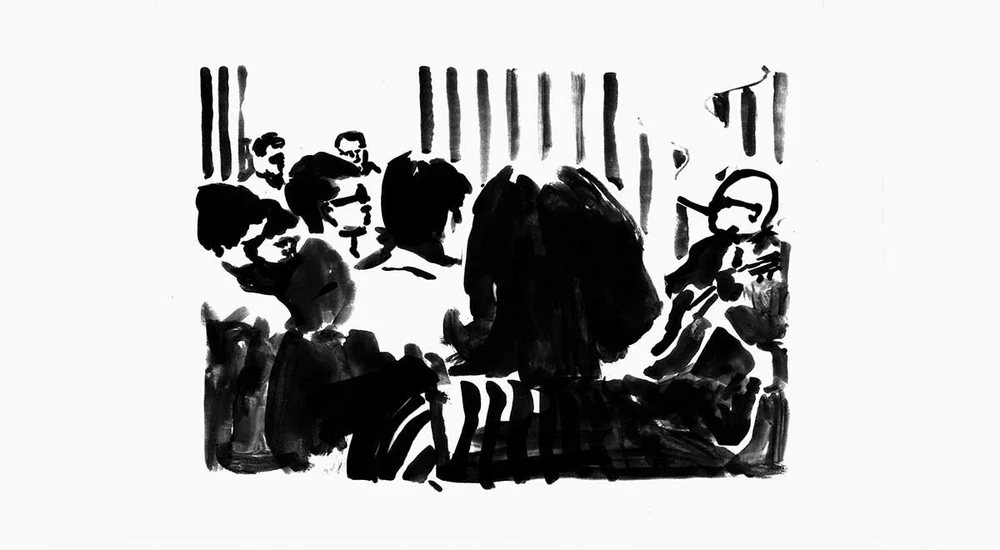Keepin' the Faith with G. Bruce Boyer: The Reverend Gary Davis
By G. Bruce Boyer
Jul 13, 2022

Let G. Bruce Boyer be your guide through the heady world of early blues, rock 'n' roll, jazz and R&B. This inaugural installment looks to the inimitable Reverend Gary Davis, and his unmatched ability to make a joyful noise.
They simply don’t make ‘em like the Reverend any more. Born in South Carolina in 1896, Gary Davis was a self-taught itinerant guitarist-singer and touring Baptist preacher most of his life. It would have been a particularly difficult sojourn since he was born half-blind, and completely so by his mid-twenties. But a musician preacher may have been what he was meant to be because he could sure play the hell out of his old Gibson guitar. And every ounce of pain and hope was there in his powerful voice. He was perhaps the last in a long line of religious street musicians. There are still plenty of street musicians, but no one told it like the Rev.

He recorded as early as 1935, mostly gospel songs, but blues – the Devil’s music -- as well. The recording history is as sporadic as his life. After the legendary 1933 recordings on thePerfectlabel, he recorded again in 1954 and '56, and a magnificent session of “holy blues” in 1960. His “Cocaine Blues” became something of an anthem when he was re-discovered by the 1960s generation of folk singers, the most famous version at that time done by Kris Kristofferson. And like other old blues singers from the '30s and '40s still alive and brought out of obscurity just short of the grave, he was invited to folk and blues festivals and university concerts from the '60s until his death in 1972. To that generation of hippies and flower-power children, some of whom he even deigned to teach a few licks, he was a living legend. He deserved it.
So much for the short account. But not even the most extensive biography can hope to give any indication of his searingly powerful voice and intricate playing style. His voice is like a scorching chainsaw that strips flesh from bone, and the guitar fingering deceptively stringent and simple, a two-fingered Carolina Piedmont style in which the instrument seems to speak directly for itself. Davis is said to have told a fan he only used thumb and forefinger to pluck because that’s all he needed. To hear “Great Change Since I Been Born”, or “Death Don’t Have No Mercy” is to understanding something of religion in the raw, religion without the platitudes.

Like his near contemporaries Brownie McGee and Big Bill Broonzy, also street singers and guitarists, Davis deserves to be better known. He was one of the best guitarists ever to play Afro-American music, sacred or profane, and the immediate intensity in his voice reflects the hellfire and brimstone preachers of the day. His “I’ll do My Last Singing” is as movingly poignant a spiritual as you will ever hear. There isn’t much delicacy about Davis’s playing and singing, but there’s wonderful nuance and unforgettable style. He could play and sing behind the beat or in front of it, run counter-point all over the place with such a seemingly focused abandonment he sounded as though he was making it all up on the spot.
When you think about that all-star band of blues musicians, better save a place for the Rev.
One of these mornings and it won’t be long,
You’re gonna call me and I’ll be gone,
I belong to the band, Hallelujeh.
Discography: Eight of the Best
Harlem Street Singer (Prestige/Bluesville)
Rev. Gary Davis at Home & Church (Stefan Grossman’s Guitar Workshop)
Rev. Gary Davis Live at Gerde’s Folk City (Stefan Grossman Guitar workshop)
Complete Early Recordings (Yazoo)
Live at Newport (Vanguard)
Pure Religion & Bad Company (Smithsonian Folkways)
Demons & Angels (Shanachie)
If I Had My Way (Smithsonian Folkways Recordings)










